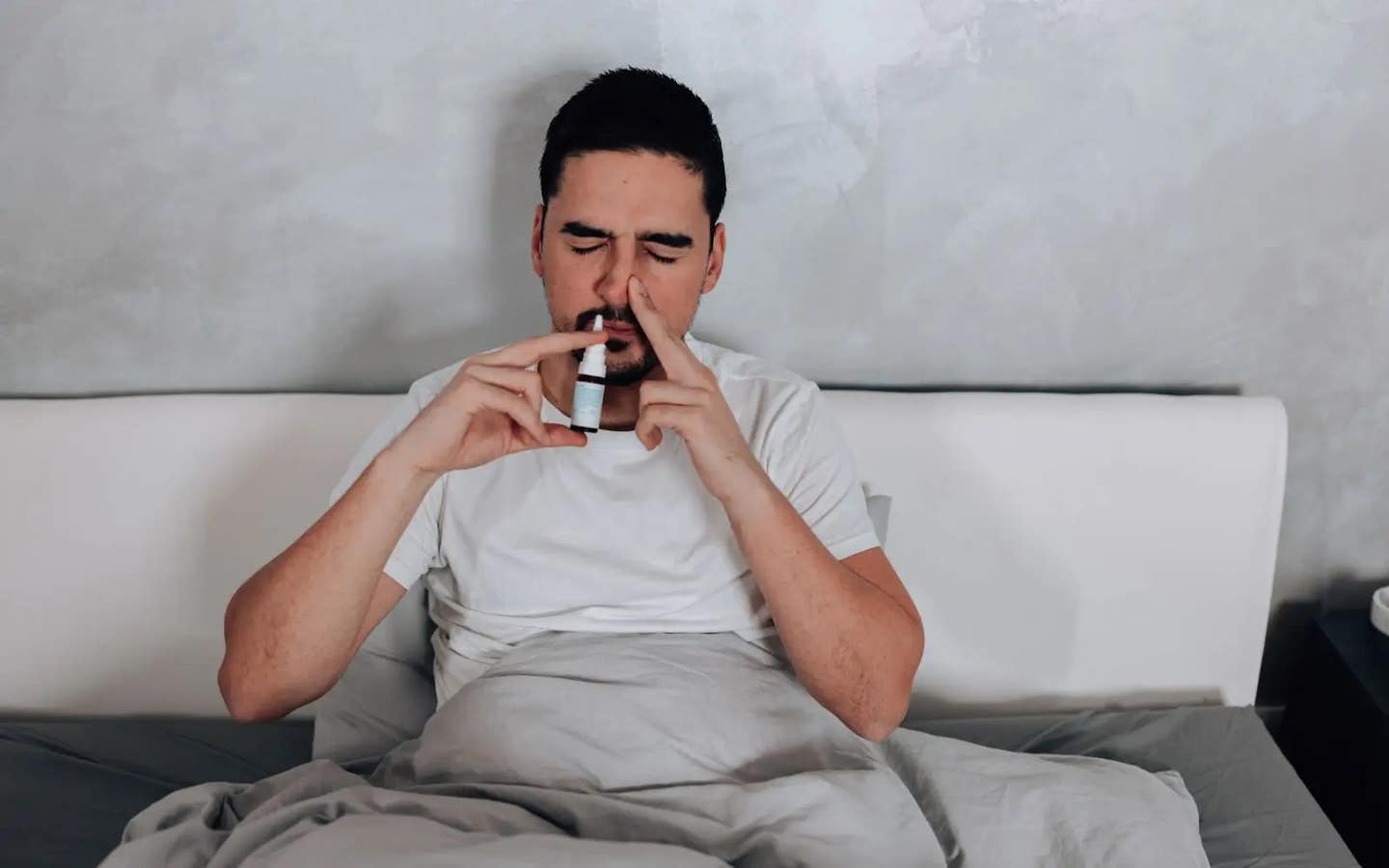Oxytocin nasal spray shows promise for treating alcoholism and obesity
Oxytocin, best known for promoting love and bonding, is now being studied for its ability to reduce alcohol cravings and food addiction.

New studies suggest oxytocin can reduce alcohol cravings and overeating by reshaping brain reward systems. (CREDIT: CC BY-SA 4.0)
Oxytocin, often called the "love hormone" for its role in social bonding and maternal behaviors, is now being investigated for something unexpected—its ability to regulate addictive behaviors and overeating.
New studies suggest that oxytocin could play a powerful role in treating alcohol use disorder and obesity by reshaping how the brain responds to cravings and rewards.
Targeting Alcohol Dependence Through Brain Chemistry
Alcohol dependence is a serious global health problem, with about 6% of the world’s population affected. It’s not just a habit—it rewires the brain. Over time, repeated drinking changes how brain regions involved in stress, pleasure, and decision-making function. These changes drive a person to keep drinking, not necessarily for pleasure, but to escape negative emotions. This cycle is known as negative reinforcement.
Researchers have zeroed in on the brain's central nucleus of the amygdala, or CeA, which becomes hyperactive during alcohol withdrawal. This brain region is packed with GABA neurons, which normally help regulate stress and anxiety. But alcohol increases GABA signaling in the CeA, reinforcing alcohol’s calming effect and deepening dependence. That’s where oxytocin steps in.
In a study published in PLOS Biology, researchers from the National Institutes of Health and The Scripps Research Institute explored how oxytocin affects alcohol-dependent rats. They found that oxytocin—whether injected, sprayed into the nose, or delivered directly to the brain—blocked excessive alcohol drinking in dependent rats. This did not happen in rats that were not dependent. Interestingly, oxytocin had little effect on general movement or interest in sweet non-alcoholic drinks when delivered intranasally.
The researchers also discovered that oxytocin changed how GABA functioned in the CeA. While it reduced spontaneous GABA responses in all rats, it only blocked the alcohol-induced GABA spikes in the dependent ones. These findings suggest oxytocin works directly in the brain to reduce the drive to drink, particularly in those already showing signs of alcohol use disorder.
Related Stories
A Hormone That Curbs Cravings for Food
The same hormone may also help reduce overeating. Obesity affects nearly 40% of American adults, and researchers believe that for some, the brain's reward system plays a large role. People who are obese tend to show more brain activity in response to high-calorie foods like pizza and donuts, even when they’re not hungry. This increased brain response could drive them to eat for pleasure rather than need.
Elizabeth Lawson, a neuroendocrinologist at Massachusetts General Hospital and Harvard Medical School, has studied oxytocin’s effects on how people react to food. In one study, she and her team showed images of calorie-dense foods to ten overweight and obese men. When the men were given oxytocin through a nasal spray, brain areas tied to food pleasure became less active.
Lawson said, “One of the key ways oxytocin works in limiting the amount of food that we eat is that it speeds up the satiety process, or reaching fullness.” Oxytocin also boosts impulse control and reduces activity in the hypothalamus, the brain's hunger center. In short, it appears to lower the reward of eating and make it easier to stop when full.
These findings are part of a growing body of research suggesting that oxytocin might help regulate food cravings in the same way it helps reduce alcohol dependence. Both behaviors—drinking and eating—tap into the brain’s reward circuits, and oxytocin seems to adjust how these circuits fire.
A Closer Look at Oxytocin’s Pathways
Oxytocin is produced in the brain’s hypothalamus and released by the pituitary gland. It has long been known for helping with childbirth, breastfeeding, and social bonding. But researchers are now studying how the hormone influences metabolism and emotional behavior.
Oxytocin receptors are found not just in the brain but also in other parts of the body—like the heart, gut, pancreas, and fat tissue. In fat tissue, it helps break down fats and supports insulin sensitivity. It also aids the pancreas in releasing insulin and regenerating insulin-producing cells. In the liver and muscles, oxytocin helps with glucose uptake, which is crucial for managing blood sugar levels.
Animal studies show that oxytocin, when used daily, can lead to weight loss. It activates enzymes and pathways in the body that burn fat and increase energy use. These physical effects, combined with the hormone’s influence on brain reward centers, make it a strong candidate for treating obesity.
However, not all delivery methods are equal. While both injections and nasal sprays can get oxytocin into the brain, nasal sprays are easier to use and seem to avoid unwanted side effects. In the alcohol study, for instance, nasal oxytocin didn’t affect the rats’ normal activity or interest in sweet flavors, while injections slightly reduced both.
Toward a New Class of Treatments
Researchers caution that oxytocin isn’t a miracle cure—at least not yet. Most of the studies have been small, with limited numbers of participants, and many focus only on men. More work is needed to confirm that the hormone works the same way in women and to better understand the long-term effects of repeated use.
Despite the early stage of research, the findings are promising. Intranasal oxytocin appears to reduce the brain’s response to rewarding stimuli like alcohol and high-calorie food. It also supports the body’s ability to regulate hunger and metabolism.
Because oxytocin can work both in the brain and throughout the body, it could become part of a new class of treatments that target the root causes of addiction and overeating.
Dr. Lawson and her team are currently running a randomized, controlled trial funded by the National Institutes of Health. It will test the effects of oxytocin nasal spray in obese men and women over an eight-week period. Meanwhile, behavioral tests continue to confirm what brain scans have shown: after taking oxytocin, people feel less compelled by images of food, especially rich or unhealthy options.
One trial showed that after taking oxytocin, volunteers responded more slowly to images of food, suggesting they were less driven by hunger or cravings. They showed little change in response to romantic or scenic images, indicating that oxytocin’s effect was specific to food reward.
Still, researchers warn that oxytocin use comes with risks. Side effects may include nausea, low blood pressure, and changes in heart rhythm. These must be fully understood before the hormone can be widely used.
But if future trials confirm current findings, oxytocin could become a new tool in the fight against addiction and obesity—two of the most pressing public health challenges today.
Note: The article above provided above by The Brighter Side of News.
Like these kind of feel good stories? Get The Brighter Side of News' newsletter.



